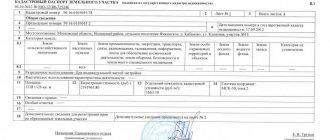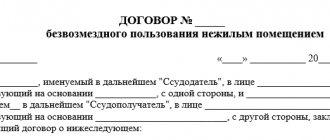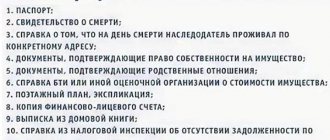Home / Real estate / Land / Use, ownership / Right to use land
Back
Published: 01/25/2017
Reading time: 12 min
0
1401
The right of gratuitous fixed-term use in modern Russia is one of the common rights to land plots, according to which the land is exploited in accordance with its intended purpose.
However, this right is not the right of ownership of land and only allows you to use the plot for your own purposes, but not to dispose of it.
- Legislation
- The concept and features of the right to free-term use of a land plot
- What areas can be provided for free, fixed-term use?
- Who can exercise this right?
- Transfer conditions
- Agreement for free, fixed-term use of land: drafting, necessary documents and procedure for registration
- Procedure and grounds for termination
Concept. The legislative framework
The regulation of norms and the right to provide citizens of the Russian Federation with land plots for use is carried out by the following laws and acts:
- Land Code (Article 24). This part of the Land Code explains which areas can be provided to citizens for use. Also, in parallel with this, the circle of persons who are entitled to apply for their provision is limited;
- Civil Code of the Russian Federation (Articles 689 to 701). They reflect the full list of actions that are carried out from the moment the basis for receiving and writing the application arises. Situations possible during the further use of the plots are described in detail, possible reasons for refusal to issue land, as well as grounds for termination of use are indicated.
List of situations in which memory is provided for urgent free useSeparately, rights and obligations are highlighted, in case of non-compliance with which the user may lose the right to use and, in addition, in the presence of particularly aggravating factors, may be held liable.
When concluding a document, its parties may be:
- the state - as the owner of a plot of land that is provided for use;
- physical or a legal entity - as a user of the allotment.
The main features of the document concluded when allocating a plot are the following:
gratuitousness - thus there will be no payment for use;- inability to pledge a land plot for the duration of its use;
- the impossibility of assigning lease rights, that is, it can only be used by the person to whom it was granted under the terms of the agreement;
- the need to return the site in the form in which it was received (meaning no deterioration in its properties). If such a fact occurs, the user of the land will have to restore its original appearance at his own expense;
- the urgency of the contract - that is, it has a certain duration and is limited in time. The validity period may be subsequently extended by agreement of the parties. Separately, there is such a concept as indefinite permanent use of a land plot, but it has different norms and rules for the provision and direct operation;
- As a result of signing the agreement, the user of the site cannot subsequently obtain ownership of the plot.
The following categories of land may be provided for use by the state:
- plots that are owned by the state or municipality. In this case, they are allocated to state institutions. type or centers of historical and cultural heritage;
- plots that are owned by the state and are provided as a service plot (that is, to ensure a certain standard of living for its user);
- plots that are provided by individuals. or legal persons on the basis of concluded agreements;
- lands provided to religious organizations on a perpetual use basis.
It is worth noting that at the legislative level it is established that it is impossible to provide lands on which there is an encumbrance or in relation to which the concept of easement of a land plot is applied (OPrav_006).
Legislation
Legislative regulation of the right to free, fixed-term use of a land plot is carried out by two regulations - the Civil and Land Codes.
The Land Code in Article 24 explains in detail which plots can be provided for free, fixed-term use, as well as under what conditions. In addition, this rule of law explains who exactly can count on receiving a land plot with such rights.
The Civil Code allocates a whole block of articles (from 689 to 701) to regulate the right to gratuitous temporary use of a land plot. Within the framework of these articles, there is a detailed coverage of all those actions that must be taken to register the occurrence and operation of such a right.
In addition, from the standpoint of civil legislation, it is deciphered what type of rights the right of gratuitous urgent use refers to, as well as what rights the user of a land plot obtained on such grounds has. The responsibilities of the user of such a site are also fixed in this regulatory act.
Who can use the right of use?
According to the Civil Code of the Russian Federation, users of plots allocated by the state for a certain period can be:
- ordinary citizens and legal entities, if they intend to use the site provided to them for the construction of structures;
organizations of a religious nature, if they have the intention of erecting buildings of a religious nature or monuments;- construction organizations. Such allocation may be made due to the construction of buildings under government order;
- legal persons, if they intend to construct housing cooperatives, cottage-type settlements, which will not be classified as administrative. education;
- physical and legal persons who will use lands classified as forestry on the terms specified in the agreement;
- various government authorities, provided that the duration of the agreement will not exceed one year.
Who can get the right to a plot?
The state or local governments may transfer land to the following citizens and organizations:
- government institutions;
- state and municipal organizations;
- civil servants;
- citizens for agricultural activities;
- religious organizations.
Employees with whom an employment contract has been concluded have the right to office plots if the residential premises provided by the institution are located on a land plot. The full list of persons who can become borrowers is indicated in Art. 39.10 Land Code of the Russian Federation.
Reasons for presentation
The grounds for the provision of land are prescribed in the Civil Code of the Russian Federation and mainly include belonging to one of the categories of citizens or organizations that have the right to apply for the allocation of a plot, as well as the fact that they undertake to comply with the conditions for the use of land.
The main conditions, the obligation to fulfill which may allow one to obtain state-owned lands for use, are the following:
- when using land, it is imperative to focus on the allotment’s belonging to a certain category;
- when performing work, do not allow those actions that contradict those permitted in accordance with the category of land;
Grounds for receiving land for free use - under certain deadlines, which are reflected in the contract, it is possible to perform any actions with the plots only within the permissible time frame;
- comply with norms that involve the protection of natural objects on the basis of generally accepted norms (although such a provision may not even be in the agreement);
- comply with fire safety standards;
- not to violate the integrity or change the location of signs that are installed to indicate the boundaries of areas or objects;
- comply with established standards for the construction of buildings and structures.
In the event that the user of the site ceases to comply with the norms and rules established by the current agreement and the laws of the Russian Federation, this fact gives the right to unilaterally terminate the current document with subsequent prosecution.
The difference between free use and rent
The similarity with the legal relationship of leasing the right of gratuitous use is obvious - in both cases, an obligatory right to plots of land is established. In addition, in both cases, the land is transferred to a new user for use, however, in the case of a lease, this is a paid use, and in the other, accordingly, it is gratuitous. The fundamental difference between leasing and free use of land is the fact that when renting, the land is transferred to the lessor not only for use, but also for ownership, which allows him to use a set of measures to protect the owner of the object, which the user of the land is completely deprived of in the form of free use.
Design algorithm
In order to become a user of a plot of land allocated by the state, you must strictly follow the algorithm for obtaining it. First of all, it is determined who is the applicant for use.
If an ordinary citizen intends to receive land, then he is the applicant; when submitting a request for the issuance of a plot from a legal entity, the application must be made by the head of the organization - the general director or another person vested with such authority.
Procedure for obtaining rights
Actions to obtain a plot involve contacting its owner directly. In this case, since the owner is the state, the application is submitted to the municipal body of the territorial district that has the authority to consider such applications and make a decision on the allocation of plots.
It is worth noting that if the applicant for the allocation of a certain area of land for use is an individual (ordinary citizen), then no prior approval is required - a personal visit is carried out, after which, if it is possible to allocate land, the necessary documentation is provided and the contract is directly concluded.
If the applicant is a legal entity (organization, enterprise), then it is necessary to submit an application before drawing up a use agreement.
By law, a decision on such an application must be made within 20 days, but it should be understood that the consideration of applications is carried out by a specialized commission, which meets at certain intervals. If a positive decision is made, they are invited to draw up and sign an agreement.
When drawing up an application, you must adhere to a standard form, which involves reflecting certain data:
- Full name of the chairman of the land committee (or other authorized body), as well as the form of his ownership, which the legal entity is applying to. or physical face;
The procedure for providing memory for free use with prior approval - name of the organization or full name of the person who submits the application for use of the allotment;
- document's name;
- reflection of a request (provision of a site for free urgent use);
- date of completion and signature of the responsible person.
Questions from our readers
What are the differences between free use and rent?
Lease and free use are different types of transactions. In the first case, the owner of the plot can receive payment for the use of the land, in the second this is strictly prohibited.
The tenant can sublease the land. The borrower has the right to purchase the land. In case of gratuitous use, only the owner of the property can act as the landowner.
Is it possible to get a plot of individual housing construction for free use?
In accordance with Art. 39.10 of the Land Code of the Russian Federation, a land plot is provided to citizens for individual housing construction, peasant farming or running personal subsidiary plots for use for no more than 6 years in municipalities determined by the law of the constituent entity of the Russian Federation.
The allotment may be given to non-profit organizations created by individuals for the construction of housing in cases provided for by regulations.
Registration procedure
The agreement for the provision of use also has a standard form and is not subject to change, since the state acts as the owner of the plot. In some cases, legal entities attempt some adjustments, which are reflected in separate additions to the main document.
However, such changes are not made, since the text of the agreement is drawn up clearly in accordance with the legislation in force at the time of conclusion of the agreement and will be changed only if any amendments are made to the law itself.
The contract for free operation is drawn up in printed form and must be registered so that the transaction is legally secured and the transfer of ownership occurs on the basis of regulations and legislation.
The document must consist of the following parts:
- preamble - it indicates the data of the parties to the agreement - the state organization that acts as the lender and the person or organization that is the borrower;
- subject of the contract. This section details the characteristics of the site provided, indicating its exact address and cadastral data;
Example of a contract - the rights of the parties to the agreement and their obligations;
- procedure for receiving (transferring) a plot;
- main points of operation. In most cases, this paragraph contains land use rules that must be followed;
- circumstances related to force majeure that may prevent the parties from fulfilling the terms of the contract, as well as possible options for action in such situations;
- details of the parties to the agreement and their signatures;
- an appendix containing documents, including cadastral documents, which are attached to the concluded agreement.
Sample agreement for gratuitous fixed-term use of a plot
In order for the conclusion of the agreement to take place, the applicant will need to collect and provide a certain package of documents, among which should be the following:
- identification documents of the applicant (passport, in the case of a private person);
- statutory documents. They will be needed if an agreement is signed between a government agency and a legal entity. Separately, you will need to provide supporting documentation that the manager (or other person) has grounds to represent the interests of the organization in such matters. A certificate of state registration is also required;
- documents regarding the site that is leased under the terms of the agreement;
- a receipt confirming payment of the state fee for concluding an agreement of this type.
If the validity period of the agreement exceeds one year, then, in accordance with the requirements of the law, such a document is subject to additional registration in Rosreestr. The result of such registration will be the issuance of a state-issued certificate of the right to perpetual use of the site.
Transfer conditions
Article 24 of the Land Code of the Russian Federation sets out the conditions that must be met in order to fully formalize the right to gratuitous temporary use of a land plot. Such conditions will include:
- The period of provision of land to state or municipal institutions limited to one year for the full functioning of these bodies;
- The intended purpose of the land must be specified in the agreement, as well as in all transfer documents, with the obligatory indication of compliance with the requirements for using the land only for this purpose;
- Implementation of measures to protect the land plot and adjacent forests and reservoirs and preserve the quality of the land;
- Preservation of all special signs located on the site (landmarks, geodetic and cadastral signs).
In addition, it is prohibited to extend the right of sublease to plots obtained on the basis of the right of gratuitous fixed-term use, as well as to use such a plot as a contribution to the authorized capital or as collateral.
Procedure for use and grounds for termination
Both the text of the concluded agreement and the legislative acts regulating the issue of using plots on a free basis imply the possibility of terminating the concluded agreement unilaterally (when a person or organization actually does not want to continue to use it).
On the other hand, if a citizen or legal entity wishes. the person acting as the user of the site, subject to a certain procedure, has the possibility of early termination. In case of early termination of the agreement, it is imperative that the agreed terms of preliminary notification of the intention to terminate the contractual relationship be observed.
Thus, termination of the contract can be in the following form:
- Voluntary termination. In this case, one party communicates its intention, and the second does not prevent such an event. There may be several reasons for such a desire - the lack of need for use, the presence of shortcomings in the provided land, the occurrence of certain circumstances due to which further use is not possible;
- Forced. The main reason for this type of termination of an agreement is a violation of the law or clauses of the contract. This situation may arise due to its misuse or transfer to another person or organization.
Termination of an agreement
If the parties did not want to indicate in the contract the duration of its validity, then this gives the right to either party to refuse it at any time. To do this, you need to notify the other party and agree on the timing of termination of contractual obligations.
Among the reasons for early termination of contracts for the gratuitous use of land plots at the initiative of the owner are the following:
- Inadequate fulfillment of the obligation to protect land fertility.
- The type of permitted land use does not correspond to the actual use.
- The land was transferred to a third party without proper approval from the owner.
The user of the site may refuse the transaction if:
- There are certain force majeure events beyond the control of the user.
- Hidden deficiencies of the site have been identified, due to which it cannot be used as the user intended.
- The land was not transferred to the user on time, or the owner violated other essential terms of the contract.
- The agreement does not take into account the legitimate interests of third parties related to this land.
The death of any of the parties, as well as the liquidation of a legal entity, is a sufficient basis for early termination of the contract. If the owner of the plot dies, the heirs assume responsibilities under the contract. If the liquidated entity has a legal successor, then the obligations under the agreement pass to him.
Right of use
The use of state property (in this case, allotment) is initially granted to all individuals, as well as organizations registered on the territory of the Russian Federation. Despite this provision of the law, when contacting a municipal authority to submit an application, it is necessary to clearly understand and represent the purpose for which this site is needed. Such a basis must first of all clearly fall within the possible category of use.
General provisions for the use of land plots
The purposes of use can be very diverse, such as:
- growing vegetables for personal use;
- planting a garden;
- use as private household plots;
- use as a LFH;
- use as a source of grass for animals (for haymaking);
- for the construction of buildings or structures.
If, for example, the purpose of the site is exclusively agricultural, and the user initiates the start of construction of a construction project, this fact is a gross violation of the law and the main points of the contract.
What is land use
Land use should be understood as different ways of disposing of land property. It is a form of land use whose purpose is to extract its useful properties or generate income.
Land use is carried out by:
- free management;
- rational organization of the territory;
- protecting the resource from pollution and destruction;
- extraction of mineral resources located on the site.
Find out in more detail about the forms and methods of using land plots from the article “Land Use Is.”
Refusal to provide
Often, an application for the provision of a site after consideration ends in refusal. The decision to refuse can be made exclusively at the commission level and the reason for refusal can be:
- insufficiency of the documentary base - if the applicant provided an incomplete package of documents necessary for the allocation of a site;
- at the time of submitting the application, there are no sites in a particular territorial district that can be allocated;
- the applicant is not a citizen of the Russian Federation or a legal organization registered in our country.
Deadlines
The terms of use of the site are determined by a separate clause of the contract, which indicates the end date of the contractual relationship. If the party carrying out the use intends to extend the agreement, then after checking compliance with all clauses of the agreement, an additional agreement is drawn up, which indicates the new validity period.
In the event that the owner of the site is a government organization, a repeated application will be required.
Underwater rocks
Citizens may encounter the following problems:
- The land user has a pre-emptive right to prolong the contract. If a new applicant for a plot appears, a citizen or organization can try to resolve the issue with the administration or go to court to extend the agreement.
- The forced acquisition of land can be initiated by the owner ahead of schedule if there are compelling reasons or force majeure circumstances. In the latter case, the contract is considered automatically terminated by agreement of the parties.
- The right to use a service area is retained by a citizen if he has retired due to disability due to injuries received at work. Land cannot be taken from disabled spouses or parents of a deceased user. Minor children have the right to a plot until they reach 18 years of age.
Site assessment
The site assessment procedure is required so that the user of the plot, in the event of deterioration in the characteristics of the land, bears financial responsibility, expressed in monetary units. In addition, in the case of registration of an agreement with Rosreestr (if its duration is more than a year), the user is obligated to pay land tax, which, in turn, is determined on the basis of the cadastral value.
Request for information about the property
Data on the cadastral value of a plot can be taken from the cadastral passport, which is directly attached to the package of documents when concluding an agreement on free exploitation.
So, if there is a need for free use of state-owned land, an individual or legal entity must draw up a separate agreement and provide the package of documents required in each specific case. Under such conditions, legislative acts permit exclusively intended use - in accordance with the category of land allotment.
Required documents for registration
In order to register an agreement on free temporary use of a plot of land, you will need to submit the following documents to the local department of the Russian Registration Service:
- Documents identifying the owner of the land and the person to whom this plot is transferred.
- Power of attorney if one of the participants cannot be present in person. You need to prepare both an original and a copy.
- Passport of a trusted person.
- If the owner of the land is a legal entity, then it will be necessary to provide copies and originals of the constituent documents (with all additions and explanations).
- Cadastral passport for land.
- Receipt for payment of the registration fee.









